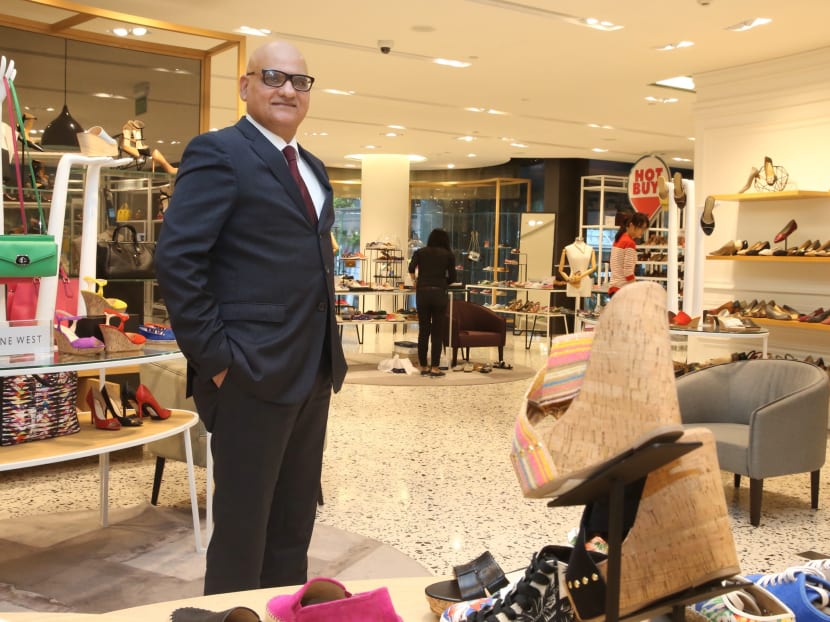Shopping malls here are ‘too many, too similar’
SINGAPORE – The Republic has “far too many” shopping malls that are too similar to one another, and this is unsustainable for the retail sector here, said the regional head of Al-Futtaim Group which manages brands such as Robinsons, John Little and Marks & Spencer.
SINGAPORE – The Republic has “far too many” shopping malls that are too similar to one another, and this is unsustainable for the retail sector here, said the regional head of Al-Futtaim Group which manages brands such as Robinsons, John Little and Marks & Spencer.
The Dubai-based conglomerate, which hires more than 20,000 people across over a dozen countries, became the first major casualty of the manpower crunch in the retail sector, when it announced last week that it will close two John Little stores - in Marina Square and Tiong Bahru - and a Marks & Spencer outlet at Centrepoint in the months ahead.
Speaking to TODAY in an interview, Mr Kesri Kapur, Al-Futtaim’s head of business in Asia, said: “I personally believe that Singapore is ‘over-retail’. There are far too many stores, far too many malls in Singapore and not enough shoppers - and these are similar types of stores.”
He added: “There is not enough differentiation in the stores. For such a small market, if it’s to be viable in the longer-term and sustainable, there has to be some differentiation (among) the stores.”
Al-Futtaim had said that the closures of its stores here would allow it to consolidate its resources. Mr Kapur said none of the affected employees will be laid off. Instead, they will be re-deployed to the remaining stores or given the option to take up other roles within the conglomerate.
Apart from the shortage of manpower, rising business costs here and changing consumer habits have also contributed to the company’s decision to shutter the stores, Mr Kapur said. “Customers are going online as well for shopping, especially the younger ones. Consumers are also becoming more knowledgeable, they want to make decisions only after doing more research,” he said.
He also noted that with more shopping malls sprouting up in the suburban areas, such as in Jurong East, Orchard Road has lost some of its allure as a major shopping belt here even as rentals continue to rise.
To better cope with the challenges in the retail scene here, the Al-Futtaim Group aims to improve its quality of service and widen its product offerings. Among other things, it plans to renovate some stores, including Robinsons Raffles City and the Marks & Spencer outlets at Paragon and Raffles City. A new Zara boutique at Changi Airport Terminal 3 will also be opened in May.
Earlier this month, Minister of State (Trade and Industry) Teo Ser Luck noted that Singapore lags behind the likes of South Korea, China and Japan when it comes to e-commerce, and said the Government has taken steps to give retailers a stronger push in this area.
Mr Kapur said his company is venturing into e-commerce, and by the end of this year, consumers could have the option of buying goods online from its stores . “It’s not just a cost cutting exercise for us. Operational efficiency and customer engagement are important, but customer engagement happens when they see something new either in terms of distribution channel or the type of products that we’re selling… it’s our intention to make (it) as convenient as possible for the consumers,” he said.
TOP SHOPPING DESTINATION NO MORE?
Mr Kapur also said the Republic is losing its lustre as the region’s top shopping destination, with its position under threat from other Southeast Asian cities whose population and spending power are growing faster.
As a result, many major brands that used to be based here only have also set up shop in places such as Bangkok, Kuala Lumpur and Jakarta, he noted.
“In the past, availability of brands, flagship stores and products were more concentrated in Singapore. Now, if you want to access a top brand, you will be able to get it in the other areas also. There are world class malls in Bangkok, Kuala Lumpur, Jakarta as well,” Mr Kapur said.
He added that the manpower crunch and rising business costs, among other factors, have led to falling service standards – another area that Singapore is losing out to its regional competitors. Nevertheless, Mr Kapur said Singapore remains one of the better places to shop given its clean and safe environment. “It’s also convenient and accessible, so Singapore still has some advantages… I believe the perception that Singapore is expensive will change in the minds of the consumers. That may be the reality when we had a stronger Singapore dollar, but now, the Singapore dollar is going down against the US dollar,” he said.







